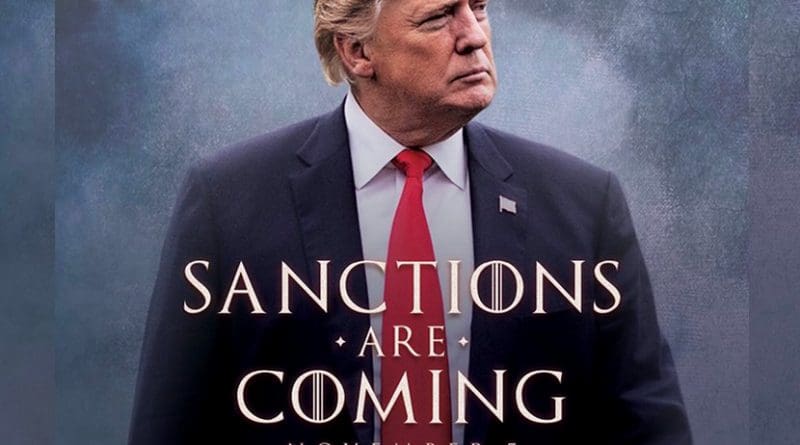Iran Sanctions: The Triumph of Short-Term Thinking – Analysis
By Maria Gioia Zurzolo
As President Donald Trump announced on Twitter last week: “Sanctions are coming.” He was referring Iranian sanctions which were reinstated on November 5, the day before 2018 midterm elections in the United States.
Game of Thrones “Winter is coming” references aside, the announcement has put a new freeze on US-Iran relations and that will bring lasting economic and political consequences to international society.
In 2015, Iran agreed on a long-term deal on its nuclear program with the P5+1 world powers: the United States, UK, France, Russia, China and Germany. The Joint Comprehensive Plan of Action (JCPOA) was negotiated with the aim of limiting Iranian nuclear activities in return for lifting economic sanctions. Iran also agreed to allow inspectors into the country to monitor its internal nuclear activities.
The Obama administration was confident that the deal would prevent Iran from developing a secret nuclear weapons program. President Obama’s approach to dealing with Iran was a pillar of his strategy to reshape the US role in the Middle East and to rehabilitate Iran as an actor on the international stage.
US foreign policy during the Obama era applied a different approach toward its conventional allies in the Middle East region for reasons related to both energy security and political stability. Following the boost in US shale gas production and the reduction of US dependency on Arab oil, Washington wanted to shift US policy focus toward other important areas such as Central Asia and China, disengaging from the conflict-torn Middle East. According to the President Obama’s view, rebalancing relations with Iran would have been one way to rebalance Saudi Arabia influence in the region, reinforcing a more bipolar distribution of power while Washington would have slowly disengaged from its own security commitment in the Middle East.
Traditional allies like Israel fiercely criticized the Obama administration’s foreign policy in the region, opposing to the JCPOA from the very beginning. The issue for Israel stems from the risk of Iranian hegemony in the region, and the threats that it might represent for Israeli security.
Since his electoral victory, Donald Trump has repeatedly argued against the deal; in his view, the terms are unacceptable and the agreement doesn’t go far enough in preventing Iran from developing a nuclear program. The deal also does nothing to prevent Iran from imposing its influence on neighboring countries like Syria and Yemen.
Washington has now reinstated sanctions aimed at energy production – the core area of the Iranian economy. Squeezing Iranian oil exports could lead to higher oil prices; this would be in the interest of domestic US oil production, which has boomed over the past few years. However, analysts are still not sure about the long-term market consequences, and oil prices have already plunged despite U.S. sanctions on Iran, showing that oil global market remains on a knife-edge.
Beside these economic concerns, Washington has maintained that re-introducing sanctions would help force the Islamic Republic to mitigate its disruptive policies in the region and to de-escalate regional tensions. However, past experience with sanctions suggests that economic hardship does not usually coincide with effective political pressure, at least in the case of Iran.
The Islamic Republic of Iran has an established position in the region and its area of influence is traditionally anchored by various allies and strategic interests. Crushing the Iranian economy might not be enough to push the Islamic Republic to change its agenda in the region, nor the regime. On the contrary, US policymakers should understand that the most efficient way to influence Iran is through multilateral cooperation. Multilateralism is also the best approach for regional stability as a whole. This time around, Washington risks being left on the outside looking in as other powers entrench their strategic relations with Iran. While the Trump administration pushes its weak and haphazardly-applied sanctions, emerging powers like China keep investing and trading with Iran, and leaving the door open for security cooperation in the future.
All in all, the U.S. strategy toward Iran is both inefficient and squarely focused on the short-term at the expense of future interests.
The opinions, beliefs, and viewpoints expressed by the authors are theirs alone and don’t reflect the official position of Geopoliticalmonitor.com or any other institution.

